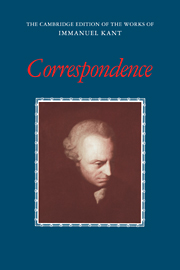Book contents
- Frontmatter
- Contents
- General Editors' Preface
- Acknowledgments
- Introduction
- Letters before 1770
- 1749
- 1759
- 1762
- 1763
- 1765
- 1766
- 1768
- 1769
- Letters 1770–1780
- Letters 1781–1789
- Letters 1790–1794
- Letters 1795–1800
- Public Declaration concerning Fichte's Wissenschaftslehre, August 7, 1799
- Biographical Sketches
- Glossary
- Index of Persons
1768
from Letters before 1770
Published online by Cambridge University Press: 07 September 2010
- Frontmatter
- Contents
- General Editors' Preface
- Acknowledgments
- Introduction
- Letters before 1770
- 1749
- 1759
- 1762
- 1763
- 1765
- 1766
- 1768
- 1769
- Letters 1770–1780
- Letters 1781–1789
- Letters 1790–1794
- Letters 1795–1800
- Public Declaration concerning Fichte's Wissenschaftslehre, August 7, 1799
- Biographical Sketches
- Glossary
- Index of Persons
Summary
Reverend, esteemed Sir,
I seize this opportunity to express to you the respect and friendship which my customary negligence in letter writing might otherwise have made you doubt. It is with a certain vanity that I observed the discriminating approbation which your recent essays have received from the public, even though they are entirely your own achievement and owe nothing to my instruction. If criticism did not have the unfortunate tendency to make a man of genius timorous, and if nicety of judgment did not make self-approval so difficult, I would venture the hope, based on the fragments I have from you, that I might live to see you become in time a master of that sort of philosophical poetry in which Pope excels. Observing the precocious development of your talents I anticipate with pleasure the time when your fertile mind, no longer so buffeted by the warm winds of youthful feeling, will achieve that gentle but sensitive tranquility which is the contemplative life of a philosopher, just the opposite of the life that mystics dream about. I look forward to that epoch of your genius with confidence – confidence being a frame of mind that is most beneficial both to its possessor and to the world; it is a frame of mind that Montange [sic] possessed hardly at all and Hume, as far as I know, exemplifies to the highest degree.
- Type
- Chapter
- Information
- Correspondence , pp. 94 - 100Publisher: Cambridge University PressPrint publication year: 1999

